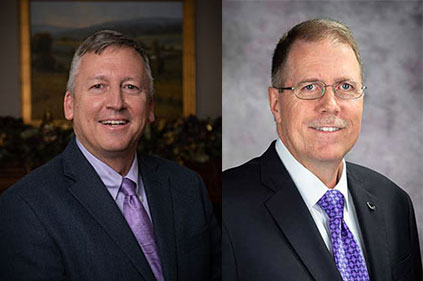January 11, 2023
Next-Gen K-State planning themes for spring task forces
Submitted by Richard Linton and Chuck Taber

Dear Faculty, Staff and Students,
As we prepare for the spring semester, we are looking forward to the dialogue and work that will lead to the completion of our university strategic plan in May. In our December strategic planning update, we shared the compiled research from the interviews, listening sessions and surveys completed in the fall. We also shared the proposed vision and values statements and asked for your feedback by Jan. 20. The next step in our strategic planning process is to organize task forces to explore themes representing priority areas of focus that will be key to our future.
Our planning themes
At our December strategic planning advisory committee retreat, six themes were identified for task forces to further explore this spring:
- Building and sustaining the next-generation land-grant workforce at K-State.
- Delivering an unmatched and impactful student experience.
- Accelerating academic innovation to meet student needs.
- Investing in the jobs and economies of tomorrow.
- Driving transformational discovery, innovation and scholarship.
- Integrating engagement across all we do.
While these themes will serve as the basis for additional dialogue that will inform our next strategic plan, they will not necessarily be the final themes for the plan. We expect that through the work and conversations of the task forces, some themes may be re-positioned or re-envisioned, while others may rise to prominence.
Our task forces
These task forces will be charged with reviewing key questions involving each theme; recommending relevant priorities, strategies and measurable outcomes aligned with each theme; and considering the stakeholders, colleges/units, programs, structures, technology, systems, funding and other resources necessary to achieve our vision.
They are being structured to include broad participation across our university community, including faculty, staff, administrators, students and alumni. Each task force will include up to 15 members who will meet throughout February and March, with their work facilitated by our Emergent Method partners. The work of these task forces will then be shared with the strategic planning advisory committee to inform their preparation of the university's draft strategic plan in April.
We are asking our deans, Cabinet members and governance council leaders to suggest individuals to participate on these task forces by Jan. 24. Our goal is to organize these task forces by the week of Feb. 6, with their work beginning in mid-February.
Our values and critical enablers
It will be important to consider each theme through the lens of each of our values. As with our previous planning processes, we also recognize that there will be a series of common elements or critical enablers such as communication and marketing, technology, funding, systems, structures and more that are constant across each theme area. These enablers are fundamental to our success and will also be considered as goals and strategies are set.
You can find more details on the Task Force Strategic Planning Themes PDF.
Other plans and initiatives
A number of existing plans or efforts already underway will also become key parts of our future. Our economic prosperity, strategic enrollment management and diversity, equity, inclusion and belonging plans are being implemented in real time. Many of our colleges and units also have their own strategic plans they are continuing to advance. We will revisit these and other plans once the new university strategic plan is complete to strengthen and update them, building alignment across all our plans so we proceed together to realize our future.
We will also begin a holistic review of our university budget model as well as a new campus master planning process following the completion of the new university plan. These future plans and strategic initiatives, along with others, will similarly connect to and build upon the foundation of our strategic plan.
Finally, we recognize that operational excellence across the institution is necessary to maximize our future success. This was certainly reinforced through the feedback we heard this fall. In parallel with strategic planning, we are conducting a holistic review of our university organization to identify structural or process changes that may be necessary to make our operations more effective. By doing this, we can improve the quality of life for our students and employees while saving both time and resources that can be redeployed into our institution as we move forward.
Our opportunity
The input you shared this fall has been integral in shaping our draft vision, values and thematic areas of focus, as well as identifying areas we can focus on today in addressing near-term challenges or opportunities. Moving forward, we will be challenging each of these task forces to build on this momentum and think innovatively about the future of K-State.
What does success look like for our university in 2030 and beyond? What changes should we anticipate or are already taking place around us? How do we push ourselves to best meet the needs of all those we serve? What will set K-State apart in new and exciting ways? These are just some of the questions we will ask our task forces to consider as we develop the priorities, strategies and outcomes that will guide our success and impact in the coming years.
We have such an incredible opportunity ahead of us as we develop our strategic plan to define and demonstrate what it means to become the next-generation land-grant university — one that leads innovation and economic prosperity for Kansas and beyond, equips and inspires future generations of students, and works collaboratively to address the grand societal challenges of today and the future. We look forward to continuing this process with you throughout the spring and the exciting progress we will make together.
Go 'Cats!
Richard Linton
President
Chuck Taber
Provost and executive vice president
